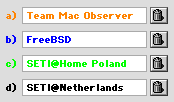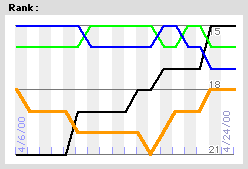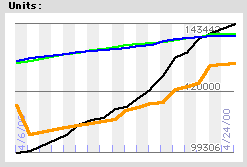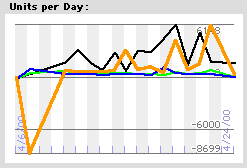A Look at SETI Checker25 April 2000 - Dan Knight
SETI
Checker is a great freeware program for comparing your
team (in our case, Team
Mac Observer) with other teams participating in the SETI@home project. The chart
displays six items of information for up to four teams, but
only four of those items are really significant.
teams participating in the SETI@home project. The chart
displays six items of information for up to four teams, but
only four of those items are really significant. The first thing is to choose your teams. Unless someone
is approaching Team Mac Observer from behind, I usually set
SETI Checker to display the three teams just ahead of us in
the standings. This week, that's FreeBSD, SETI@Home Poland,
and SETI@Netherlands.  The
first chart SETI Checker displays is the rank of the
selected teams for the past 18 days, as in the example to
the left. As you can see, both SETI@Netherlands and Team Mac
Observer spent some time at #21 during that time, and all
three teams ahead of Team Mac Observer also spent some time
as high as #15 in the club team standings. The
first chart SETI Checker displays is the rank of the
selected teams for the past 18 days, as in the example to
the left. As you can see, both SETI@Netherlands and Team Mac
Observer spent some time at #21 during that time, and all
three teams ahead of Team Mac Observer also spent some time
as high as #15 in the club team standings.
The key graph is right below the standings; it shows how
many units each team has completed on a day-by-day basis.
You can see where  Team
Mac Observer lost its top member on April 17 and lost a lot
of work units. You can also see how FreeBSD and SETI@Home
Poland have been in a virtual tie for weeks now - one day
Poland will take the lead, another day the BSD crew moves
ahead. Team
Mac Observer lost its top member on April 17 and lost a lot
of work units. You can also see how FreeBSD and SETI@Home
Poland have been in a virtual tie for weeks now - one day
Poland will take the lead, another day the BSD crew moves
ahead. But what's really impressive is how the relatively new
Dutch team (black) keeps climbing in the standings as more
and more Dutchmen hear about it and join it.  This
brings us the the next really significant chart, the one
showing team membership. A quick glance lets you know that
both FreeBSD and SETI@Home Poland are not gaining a lot of
new members, but Team Mac Observer and SETI@Netherlands are
growing rapidly. (The Dutch team is growing very rapidly and
may soon have more members than Team Mac Observer.) This
brings us the the next really significant chart, the one
showing team membership. A quick glance lets you know that
both FreeBSD and SETI@Home Poland are not gaining a lot of
new members, but Team Mac Observer and SETI@Netherlands are
growing rapidly. (The Dutch team is growing very rapidly and
may soon have more members than Team Mac Observer.)
 The
final important piece of information is how fast each team
is adding work units to their total. The Polish and BSD
teams are steadily adding about the same number of work
units each day. Team Mac Observer and SETI@Netherlands are
slowly gaining in average units per day, but also gaining a
lot of work units on single days as new members join our
teams. The
final important piece of information is how fast each team
is adding work units to their total. The Polish and BSD
teams are steadily adding about the same number of work
units each day. Team Mac Observer and SETI@Netherlands are
slowly gaining in average units per day, but also gaining a
lot of work units on single days as new members join our
teams.
SETI Checker also graphs how many hours of CPU time each
team has contributed, as well as the average time per work
unit, but neither is terribly significant for projecting
team standings. As I write this, we (Team Mac Observer) are about 10,000
units behind FreeBSD and SETI@Home Poland. According to
Dave's
stats, these teams are averaging 437-478 units per day.
It's harder to call Team Mac Observer, which Dave's
mathematical model puts at 1,987 units per day, since we've
gained a lot of members over the past week - and they've
brought existing work units with them. Dave does have a page reporting units
on a day-by-day basis. Based on that, I'm estimating we
have a base growth rate of about 800 units per day, plus
whatever we gain from new members. This has us gaining on
the next two teams at somewhere about 300-400 units per day,
which means it could be weeks before we catch up unless
still more people join Team Mac Observer. And join they are! Over the past three weeks, we've had
over 100 members join the team. In fact, we are the only Mac
team climbing in the club standings, thanks to people like
you joining us (hint, hint). If you've got a relatively fast Power Mac or clone
(anything over 150 MHz should do the job), consider
downloading the SETI@home software and joining our
team. 
Recent articles about SETI@home- Team 6100 Update, 2001.12.20. We've
completed over 500 units and donated over 5 years of CPU time to
SETI@home since May 2000.
- Team 6100 @300 units, SETIonMac,
2001.08.14. Team using old Power Macs has passed the 300 unit mark
running SETI@home.
- SETI@home monthly update,
2001.08.01. Sad news - Team Mac Observer has fallen to #26 in the
team standings.
- A look at SETI Checker,
2000.04.25. This freeware program lets you follow your favorite
SETI@home teams.
Links
- back to
SETIonMac index
| 

 teams participating in the SETI@home project. The chart
displays six items of information for up to four teams, but
only four of those items are really significant.
teams participating in the SETI@home project. The chart
displays six items of information for up to four teams, but
only four of those items are really significant. The
first chart SETI Checker displays is the rank of the
selected teams for the past 18 days, as in the example to
the left. As you can see, both SETI@Netherlands and Team Mac
Observer spent some time at #21 during that time, and all
three teams ahead of Team Mac Observer also spent some time
as high as #15 in the club team standings.
The
first chart SETI Checker displays is the rank of the
selected teams for the past 18 days, as in the example to
the left. As you can see, both SETI@Netherlands and Team Mac
Observer spent some time at #21 during that time, and all
three teams ahead of Team Mac Observer also spent some time
as high as #15 in the club team standings. Team
Mac Observer lost its top member on April 17 and lost a lot
of work units. You can also see how FreeBSD and SETI@Home
Poland have been in a virtual tie for weeks now - one day
Poland will take the lead, another day the BSD crew moves
ahead.
Team
Mac Observer lost its top member on April 17 and lost a lot
of work units. You can also see how FreeBSD and SETI@Home
Poland have been in a virtual tie for weeks now - one day
Poland will take the lead, another day the BSD crew moves
ahead. This
brings us the the next really significant chart, the one
showing team membership. A quick glance lets you know that
both FreeBSD and SETI@Home Poland are not gaining a lot of
new members, but Team Mac Observer and SETI@Netherlands are
growing rapidly. (The Dutch team is growing very rapidly and
may soon have more members than Team Mac Observer.)
This
brings us the the next really significant chart, the one
showing team membership. A quick glance lets you know that
both FreeBSD and SETI@Home Poland are not gaining a lot of
new members, but Team Mac Observer and SETI@Netherlands are
growing rapidly. (The Dutch team is growing very rapidly and
may soon have more members than Team Mac Observer.) The
final important piece of information is how fast each team
is adding work units to their total. The Polish and BSD
teams are steadily adding about the same number of work
units each day. Team Mac Observer and SETI@Netherlands are
slowly gaining in average units per day, but also gaining a
lot of work units on single days as new members join our
teams.
The
final important piece of information is how fast each team
is adding work units to their total. The Polish and BSD
teams are steadily adding about the same number of work
units each day. Team Mac Observer and SETI@Netherlands are
slowly gaining in average units per day, but also gaining a
lot of work units on single days as new members join our
teams.